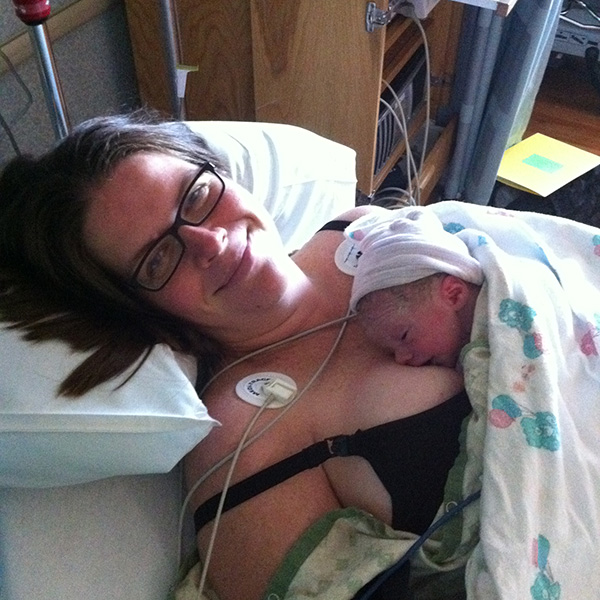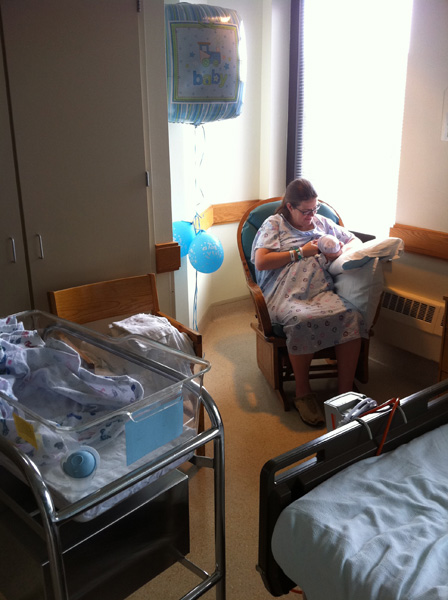When I was reading up on breastfeeding before Connor was born, the general gist I got was that breastfeeding is hard. Or it can be. Sure, it seems like it should be straightforward — whip out boob, baby eats — but there are so many things that can go wrong. I knew moms who had trouble breastfeeding, but I also I knew moms who loved nursing and did it with barely any problems at all. I was convinced that, since it’s such a natural thing, I would take right to it. I wouldn’t have any latching or supply or dietary issues. It couldn’t possibly be that hard.
I was wrong. Breastfeeding is hard.

I gave birth the weekend before I was scheduled to attend my breastfeeding class at the hospital. With all the reading I’d done, though, I figured I was good to go. In the recovery room, after the birth, the nurse brought Connor to me and we nursed for the first time. It was new and awkward and beautiful.
It was also a lot easier than subsequent nursing sessions in the hospital.
It was hard getting him to latch. Since my milk hadn’t come in yet, Connor apparently didn’t realize that the boob was the source of food, so the nurses had me drip a little formula on my nipple to get Connor interested. It was hard to come to terms with the fact that he needed artificial guidance to show him where the real stuff was. Once he figured out where the noms were, it was hard getting him to stay awake long enough to eat. It was also hard to figure out how to hold his floppy head where it needed to be without letting it fall into my armpit. It was hard to determine whether he was actually eating enough — he was three weeks early and was a skinny dude (5 pounds 15 ounces), so I was worried about him losing too much weight in those first few days. By monitoring the number of wet diapers, though, we knew he was doing OK — he wasn’t dehydrated, anyway.
Finally, with the help of multiple nurses and a lactation consultant, Connor and I both figured out the logistics of breastfeeding. It had never occurred to me that we’d have to learn, that he wouldn’t necessarily come out with an innate knowledge of how to nurse.
During those few days in the hospital, breastfeeding was hard.

My milk finally came in the day after we got home from the hospital. It was hard dealing with those couple of days of painful engorgement. It was also hard to be the sole provider of Connor’s nutrition every two hours, night and day. I mean, intellectually, I thought I understood — in reality, though, the sleep deprivation takes its toll. It was especially hard when Connor didn’t get to sleep after a feeding, and one feeding would stretch into two.
I was glad that Aaron was willing to wake up with me, even though he didn’t necessarily have to; the fact that it was hard on both of us made it easier, somehow. My memories of those first couple of weeks are centered around 2am feedings in Connor’s room, with me sitting in the chair wrapped in a blanket, nursing, and Aaron sitting on the floor keeping me company.
Those first few months of nursing a newborn were hard.

My maternity leave lasted eleven weeks. While it was hard to leave Connor, I knew he’d be fine with his Daddy. I started regular pumping sessions weeks before I was scheduled to go back to work, to build up a freezer stash. Pumping was hard at first, too; I tried manual pumping and got a mere drizzle to show for it, but things picked up when I got my double electric pump. I had a pretty decent stash by the time I had to go back to work.
Or so I thought.

Even though Connor was still nursing every two or three hours, I only felt comfortable taking two pump breaks a day: 9:30am and 2:30pm. I scheduled my pump breaks on my calendar so that my co-workers would have to schedule meetings around them. Even with only two pump breaks a day, it was hard to keep up with my work when I couldn’t get thoroughly involved in a project before having to go pump or go to a meeting.
Aaron and I kept careful logs of how much Connor ate and how much I pumped. I would pump after Connor’s early morning feeding, before I left for work, and would get another full 4 oz bottle for his next feeding; then I’d have my two pump breaks at work; then I’d nurse him in the evenings after I got home. The trouble started when Connor started eating more during the day than I was pumping — one morning, he ate a 10 oz breakfast after I’d gone to work!
The idea of keeping track of pumping vs. bottlefeeding was so that I could regulate my pumping sessions to compensate. It was hard, though — once I got home, I didn’t really have ten minutes where I could leave Connor alone (i.e. not hold him) long enough to pump. Then, after I got him to bed, I was usually so exhausted myself that I wasn’t interested in a 10pm pumping session — I just wanted to go to bed before he woke back up and wanted to eat again.
It was hard to watch my freezer stash dwindle away.

At Connor’s four-month well-child visit, we informed the pediatrician that we would have to start supplementing with formula that week. It was a hard thing for me to accept, but she reacted as if it were a totally normal thing, part of life with an infant, no big deal. Connor would still get the benefits of breastfeeding, even with us supplementing with formula. We left the office with a few tubs of formula samples and the doctor’s reassurance that supplementing was perfectly fine. But it was still hard.
I still exclusively breastfed Connor in the mornings and evenings, and mostly breastfed on weekends — the convenience factor of having Aaron feed Connor was alluring — but I could only pump so much for his weekday feedings. During the day, his largest feeding would be mother’s milk, and the rest would be formula. It became a vicious cycle: less supply meant he nursed less, which meant my supply went down. And I didn’t find any extra time at work or in the evenings to pump more than I had been.
I could tell the end was near, but it was hard to admit.
Finally, after Connor turned six months old, came that fateful morning. We did our normal morning routine: I went into his room and picked him up out of his crib, changed his diaper, took him downstairs to the living room to nurse on the couch — but instead of nursing and falling back to sleep, this time he nursed for five minutes, then cried.
He was still hungry.
I went and made him a bottle of formula, as hard as that was for me. I knew that was the beginning of the end.
I still nursed him for the next couple of weeks, but my pumping sessions had become almost a joke. Where I used to get an average of three to four ounces per session, I’d gone down to a mere ounce or less. I cut down to a single pumping session per day, then stopped altogether. I continued to nurse Connor for a few minutes in the morning before giving him a bottle, and in the evenings before feeding him rice cereal. It was hard to come to terms with the fact that I wasn’t going to be breastfeeding for the full year I had planned, and I was almost in denial of the fact — but I finally made the decision to stop.
Those last few early morning feedings were so precious. I’d think back to the marathon half-hour-long nursing sessions we used to share when he was a newborn, and remember the bleary-eyed sleep deprivation of frequent feedings. While I was thankful to be past those difficult nights — and the preceding evenings when I’d live in dread of what was to come — I knew I would look back with love on those bonding moments we had shared.
Breastfeeding is hard… to give up.